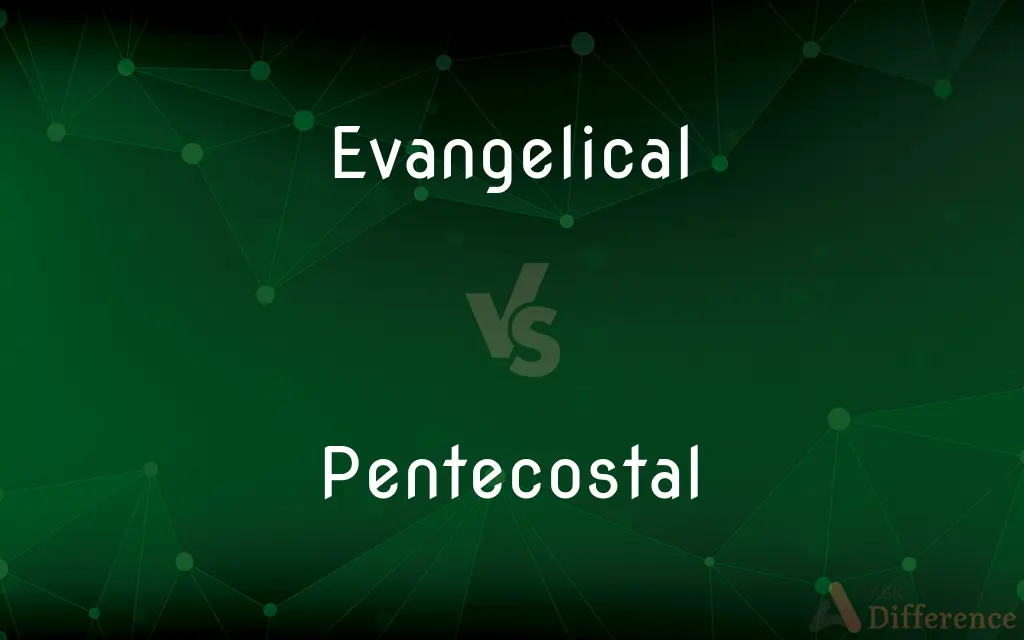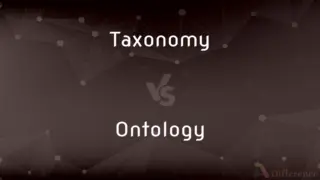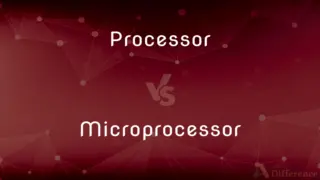Evangelical vs. Pentecostal — What's the Difference?
By Urooj Arif & Fiza Rafique — Updated on March 16, 2024
Evangelical Christianity emphasizes salvation through faith in Jesus and the authority of the Bible. Pentecostalism focuses on the Holy Spirit's gifts, including speaking in tongues and healing.

Difference Between Evangelical and Pentecostal
Table of Contents
ADVERTISEMENT
Key Differences
Evangelical Christianity is a broad movement within Protestantism that emphasizes the need for personal conversion experiences, the authority of the Bible, and spreading the gospel. Pentecostalism, while sharing these beliefs, distinctly emphasizes the active work of the Holy Spirit in believers' lives, particularly through speaking in tongues, prophecy, and healing.
Evangelicals prioritize the Bible as the ultimate authority on faith and practice, advocating for its interpretation based on its plain meaning. Pentecostals also hold the Bible in high regard but place a significant emphasis on the experiential aspects of faith, including direct experiences of the Holy Spirit.
One of the key practices in Pentecostalism is speaking in tongues (glossolalia), considered evidence of being filled with the Holy Spirit. While some Evangelicals may also practice speaking in tongues, it is not viewed as essential to one's faith or spiritual experience.
Evangelicalism encompasses a wide range of denominations and independent churches, promoting a focus on personal faith and conversion without necessarily endorsing specific spiritual gifts. In contrast, Pentecostalism is known for its vibrant worship services, including expressive forms of prayer and music, reflecting its belief in the Holy Spirit's immediate presence and power.
Evangelical Christianity and Pentecostalism both stress the importance of evangelism and missionary work, driven by the mandate to share the gospel. However, Pentecostalism's approach often includes testimonies of healing and other miracles as evidence of God's power and the truth of the Christian message.
ADVERTISEMENT
Comparison Chart
Core Belief
Salvation through faith in Jesus, Bible authority
Holy Spirit's gifts, speaking in tongues, healing
Bible Authority
Central, with a focus on plain interpretation
Central, with emphasis on experiential faith
Spiritual Gifts
Diverse views, not essential for all
Essential, especially speaking in tongues
Worship Style
Varies, generally conservative
Vibrant, expressive worship and prayer
Emphasis
Personal conversion, evangelism
Holy Spirit's power, miracles, evangelism
Compare with Definitions
Evangelical
Pertaining to the Christian gospel; emphasizing salvation through faith in Jesus.
Evangelical churches often have strong youth outreach programs.
Pentecostal
Emphasizing the Holy Spirit's gifts, such as speaking in tongues and healing.
Pentecostal services often feature moments of healing prayer.
Evangelical
Focused on the need for personal conversion.
Evangelical meetings frequently include calls to conversion.
Pentecostal
Advocates for direct, personal experiences with God.
Pentecostal believers seek personal encounters with God through prayer.
Evangelical
Denominational diversity with shared core beliefs.
Evangelical Christians come from various denominational backgrounds.
Pentecostal
Focus on evangelism, including miracles as a testimony.
Pentecostal missionaries often report miracles on the mission field.
Evangelical
Believing in the authority of the Bible.
Evangelical doctrine stresses regular Bible study and application.
Pentecostal
Known for vibrant, expressive worship.
Pentecostal worship includes lively music and speaking in tongues.
Evangelical
Committed to spreading the Christian gospel.
She participated in evangelical missions abroad.
Pentecostal
Belief in the baptism of the Holy Spirit.
He shared his testimony about receiving the Holy Spirit's baptism.
Evangelical
Of, relating to, or in accordance with the Christian gospel, especially one of the four gospel books of the New Testament.
Pentecostal
Of, relating to, or occurring at Pentecost.
Evangelical
Evangelical Of, relating to, or being a Christian church believing in the Bible as the sole source of religious authority, in salvation only through conversion and spiritual regeneration, and in the necessity of public witness to faith.
Pentecostal
Of, relating to, or being any of various Christian religious congregations whose members seek to be filled with the Holy Spirit, in emulation of the Apostles at Pentecost.
Evangelical
Of or relating to the Lutheran churches in Germany and Switzerland.
Pentecostal
A member of a Pentecostal congregation.
Evangelical
Of or relating to all Protestant churches in Germany.
Pentecostal
Of or pertaining to Pentecost or to Whitsuntide.
Evangelical
Of or relating to the group in the Church of England that stresses personal conversion and salvation by faith.
Pentecostal
Any member of a Pentecostal religious body
Evangelical
Characterized by ardent or crusading enthusiasm; zealous
An evangelical liberal.
Pentecostal
Of or relating to or characteristic of any of various Pentecostal religious bodies or their members
Evangelical
Evangelical A member of an evangelical church or party.
Pentecostal
Of or relating to or occurring at Pentecost
Evangelical
Pertaining to the doctrines or teachings of the Christian gospel or Christianity in general.
Evangelical
Pertaining to the gospel(s) of the Christian New Testament.
Evangelical
Protestant; specifically Lutheran and Calvinist churches in continental Europe as well as their offshoots in North America.
Evangelical
Pertaining to a movement in Protestant Christianity that stresses personal conversion and the authority of the Bible (evangelicalism).
Evangelical
Pertaining to Islamic groups that are dedicated to dawah and preaching the Quran and sunnah.
Evangelical
Zealously enthusiastic.
Evangelical
A member of an evangelical church
Evangelical
An advocate of evangelicalism
Evangelical
Contained in, or relating to, the four Gospels; as, the evangelical history.
Evangelical
Belonging to, agreeable or consonant to, or contained in, the gospel, or the truth taught in the New Testament; as, evangelical religion.
Evangelical
Earnest for the truth taught in the gospel; strict in interpreting Christian doctrine; preëminently orthodox; - technically applied to that party in the Church of England, and in the Protestant Episcopal Church, which holds the doctrine of "Justification by Faith alone;" the Low Church party. The term is also applied to other religious bodies not regarded as orthodox.
Evangelical
Having or characterized by a zealous, crusading enthusiasm for a cause.
Evangelical
Adhering to a form of Christianity characterized by a conservative interpretation of the bible, but disavowing the label 'bdfundamentalist`'b8.
Evangelical
One of evangelical principles.
Evangelical
Relating to or being a Christian church believing in personal conversion and the inerrancy of the Bible especially the 4 Gospels;
Evangelical Christianity
An ultraconservative evangelical message
Evangelical
Of or pertaining to or in keeping with the Christian gospel especially as in the first 4 books of the New Testament
Evangelical
Marked by ardent or zealous enthusiasm for a cause
Common Curiosities
Can you be both Evangelical and Pentecostal?
Yes, one can identify as both Evangelical and Pentecostal, as Pentecostalism is a movement within broader Evangelical Christianity that shares core beliefs but emphasizes the Holy Spirit's gifts.
What is speaking in tongues?
Speaking in tongues, or glossolalia, is a spiritual gift characterized by speaking in languages unknown to the speaker, considered a sign of the Holy Spirit's presence in Pentecostalism.
What distinguishes Evangelical Christianity from Pentecostalism?
The main distinction lies in Pentecostalism's emphasis on the Holy Spirit's gifts, such as speaking in tongues and healing, whereas Evangelical Christianity focuses on salvation through faith in Jesus and the authority of the Bible.
Do all Pentecostals speak in tongues?
While speaking in tongues is a common practice and valued as evidence of the Holy Spirit's baptism in Pentecostalism, not all Pentecostals may personally practice it.
Are miracles important in Pentecostalism?
Yes, miracles, including healing and prophecy, are important in Pentecostalism, seen as evidence of God's power and the Holy Spirit's active presence.
How do worship services differ between Evangelicals and Pentecostals?
Worship services in Evangelical churches can vary but are generally more conservative, while Pentecostal services are known for their vibrancy and expressive forms of worship, including speaking in tongues and prophetic messages.
How do Evangelicals view the Bible?
Evangelicals view the Bible as the ultimate authority on faith and practice, interpreting it based on its plain meaning.
What is the importance of personal conversion in Evangelical Christianity?
Personal conversion is central to Evangelical Christianity, emphasizing the need for individuals to personally accept Jesus as their savior and commit to a life of faith.
How do Pentecostals practice their faith?
Pentecostals practice their faith through vibrant worship, speaking in tongues, prophecy, healing, and a strong emphasis on personal, experiential encounters with the Holy Spirit.
What role does evangelism play in both movements?
Evangelism is crucial in both Evangelical Christianity and Pentecostalism, with a shared mandate to spread the gospel, though Pentecostalism may also emphasize miracles as part of its evangelistic outreach.
Share Your Discovery

Previous Comparison
Taxonomy vs. Ontology
Next Comparison
Processor vs. MicroprocessorAuthor Spotlight
Written by
Urooj ArifUrooj is a skilled content writer at Ask Difference, known for her exceptional ability to simplify complex topics into engaging and informative content. With a passion for research and a flair for clear, concise writing, she consistently delivers articles that resonate with our diverse audience.
Co-written by
Fiza RafiqueFiza Rafique is a skilled content writer at AskDifference.com, where she meticulously refines and enhances written pieces. Drawing from her vast editorial expertise, Fiza ensures clarity, accuracy, and precision in every article. Passionate about language, she continually seeks to elevate the quality of content for readers worldwide.
















































